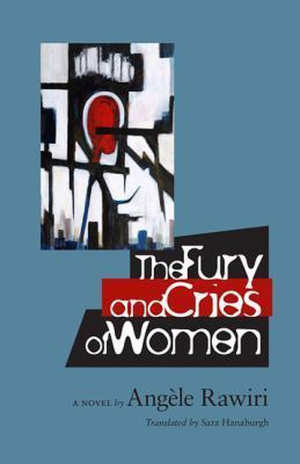Angèle Rawiri The Fury and Cries of Women recensie en informatie over de inhoud van deze roman uit Gabon. In 2014 verscheen bij Virginia University Press de Engelse vertaling van Fureurs et cris de femme de roman uit 1989 van de Gabonese schrijfster Angèle Rawiri.
Angèle Rawiri The Fury and Cries of Women
Als de redactie het boek gelezen heeft, kun je op de pagina de recensie en waardering vinden van de roman The Fury and Cries of Women. Het boek is geschreven door Angèle Rawiri. Daarnaast zijn hier gegevens van de uitgave en bestelmogelijkheden opgenomen. Bovendien kun je op deze pagina informatie lezen over de inhoud van de roman uit 1989 van de Gabonese schrijfster Angèle Rawiri.
The Fury and Cries of Women
- Schrijfster: Angèle Rawiri (Gabon)
- Soort boek: sociale roman
- Origineel: Fureurs et cris de femme (1989)
- Engelse vertaling: Sara Hanaburgh
- Uitgever: University of Virgina Press
- Verschenen: juli 2014
- Omvang: 232 pagina’s
- Uitgave: Paperback / Ebook
Flaptekst van de roman uit Gabon van Angèle Rawiri
Gabon’s first female novelist, Angèle Rawiri (1954-2010) probed deeper into the issues that writers a generation before her—Mariama Bâ and Aminata Sow Fall—had begun to address. Translated by Sara Hanaburgh, this third novel of the three Rawiri published is considered the richest of her fictional prose. It offers a gripping account of a modern woman, Emilienne, who questions traditional values and seeks emancipation from them.
Emilienne’s active search for feminism on her own terms is tangled up with cultural expectations and taboos of motherhood, marriage, polygamy, divorce, and passion. She completes her university studies in Paris; marries a man from another ethnic group; becomes a leader in women’s liberation; enjoys professional success, even earning more than her husband; and eventually takes a female lover. Yet still she remains unsatisfied. Those closest to her, and even she herself, constantly question her role as woman, wife, mother, and lover. The tragic death of her only child—her daughter Rékia—accentuates Emilienne’s anguish, all the more so because of her subsequent barrenness and the pressure that she concede to her husband’s taking a second wife.
In her forceful portrayal of one woman’s life in Central Africa in the late 1980s, Rawiri prompts us not only to reconsider our notions of African feminism and the canon of francophone African women’s writing but also to expand our awareness of the issues women face across the world today in the workforce, in the bedroom, and among family and peers.
